Table of Contents
Transforming your windows from mere functional openings to stylish focal points can have a remarkable impact on the overall ambiance of your space. But with a wide array of materials, styles and features available, deciding what material is best for window shutters can feel like navigating a maze.
One of the advantages of indoor shutters is their ability to control light. With adjustable louvers, shutters allow you to regulate the amount of natural light entering a room easily. Shutters allow you to adjust the slats to your desired level of light control, whether you want to let in a soft, diffused glow or block out harsh sunlight.
Privacy is another significant benefit provided by shutters. By adjusting the louvers’ position, you can maintain privacy within your home while allowing airflow and natural light to filter through. Shutters offer a practical solution, particularly for street-facing windows or rooms where you want to create a private and secluded atmosphere.
Different Types of Shutters
Shutters come in various styles, materials and configurations to suit different architectural designs and personal preferences. Some common types of shutters include:
- Plantation shutters: These have wide louvers and are often associated with a classic and elegant look. The best material for plantation shutters is wood or vinyl. Another plantation shutter material is composite materials.
- Traditional or colonial shutters: These shutters feature smaller louvers and are commonly found in historical or traditional architectural styles. Options for traditional or colonial shutters are wood or synthetic materials.
- Solid panel shutters: These shutters consist of solid panels without louvers. They provide maximum privacy and light-blocking capabilities and are often used for aesthetic purposes or as storm shutters in areas prone to severe weather conditions.
- Cafe shutters: These shutters cover only a window’s lower portion, exposing the upper part. They maintain privacy while allowing natural light to enter the room.
Common Shutter Materials
Shutters serve a practical purpose in light control and privacy and contribute to the overall beauty and character of your home. Each material brings its unique set of qualities and considerations. This section will explore the common shutter materials that dominate the market, providing valuable insights into their features and benefits.
Wood Shutters
Wood shutters offer a warm and elegant aesthetic that can enhance any interior or exterior design. Wood shutters are known for their versatility, as they can be customized and stained to match your preferred style and color scheme. They also provide excellent insulation and help regulate temperature and light control:
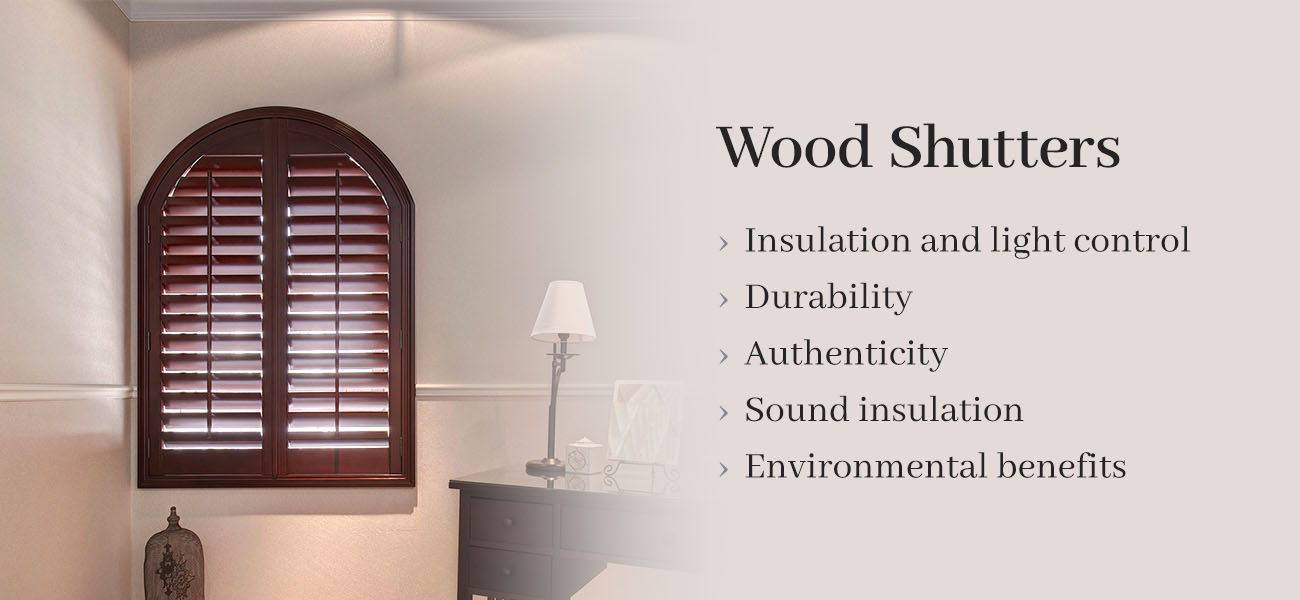
- Insulation and light control: Wood shutters provide excellent insulation, helping to regulate temperature and reduce energy costs. They also offer effective light control, allowing you to adjust the amount of sunlight entering your space.
- Durability: High-quality wood shutters, such as those made from hardwoods like basswood or cedar, are known for their durability. They can withstand everyday use and the test of time when properly maintained.
- Authenticity: Wood shutters bring a sense of authenticity and craftsmanship to your home. The natural variations in wood grains add character and uniqueness to each shutter, creating a one-of-a-kind look.
- Sound insulation: Wood shutters have inherent sound-dampening properties, helping to reduce external noise and create a quieter living environment.
- Environmental benefits: Wood is a renewable resource and responsibly sourced wood shutters can be an eco-friendly choice. Look for shutters made from sustainably harvested wood to minimize environmental impact.
However, it’s important to note that wood shutters require regular maintenance to preserve their appearance and protect them from environmental factors. Depending on the type of wood and finish, periodic sanding, painting or staining may be necessary to ensure longevity.
Vinyl Shutters
Vinyl shutters have gained popularity for their durability, affordability and low maintenance requirements. They are made from polyvinyl chloride (PVC) and offer excellent resistance to moisture, fading and warping. They also offer:
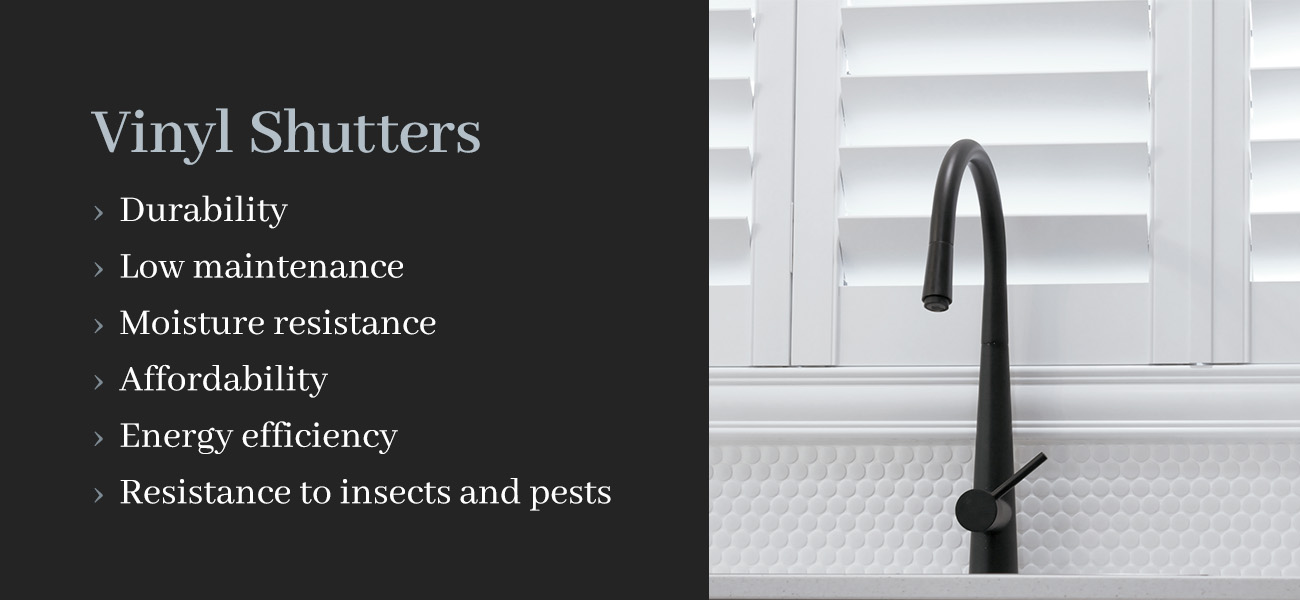
- Durability: Vinyl shutters are highly durable and resistant to common issues other materials face, such as warping, cracking and fading. They can withstand harsh weather conditions, making them suitable for interior and exterior applications.
- Low maintenance: Vinyl shutters are known for their low maintenance requirements. Unlike wood shutters, they do not require painting, staining or sealing. They can be easily cleaned with a mild detergent and water, making them a convenient choice for homeowners seeking hassle-free upkeep.
- Moisture resistance: Vinyl shutters do not absorb moisture, making them ideal for areas such as bathrooms or kitchens, as they are impervious to water damage.
- Affordability: Vinyl shutters offer an affordable option for homeowners looking to enhance their windows without breaking the bank.
- Energy efficiency: Vinyl shutters can contribute to energy efficiency by providing insulation and reducing heat transfer. They help maintain a more comfortable indoor environment and lower energy costs.
- Resistance to insects and pests: Unlike wood shutters, vinyl shutters are not susceptible to damage from insects or pests, providing a long-lasting solution without the need for additional treatments or preventive measures.
Vinyl shutters may be susceptible to heat damage, especially in regions with high temperatures or direct sunlight. Prolonged exposure to intense heat can cause the material to warp or bend. Consider the climate and sun exposure of your location when choosing vinyl shutters.
Composite Shutters
Typically made from a blend of wood fibers and synthetic materials, composite shutters offer the look and feel of wood while delivering enhanced durability and resistance to moisture. Composite shutters provide an appealing alternative that combines the benefits of many different materials:
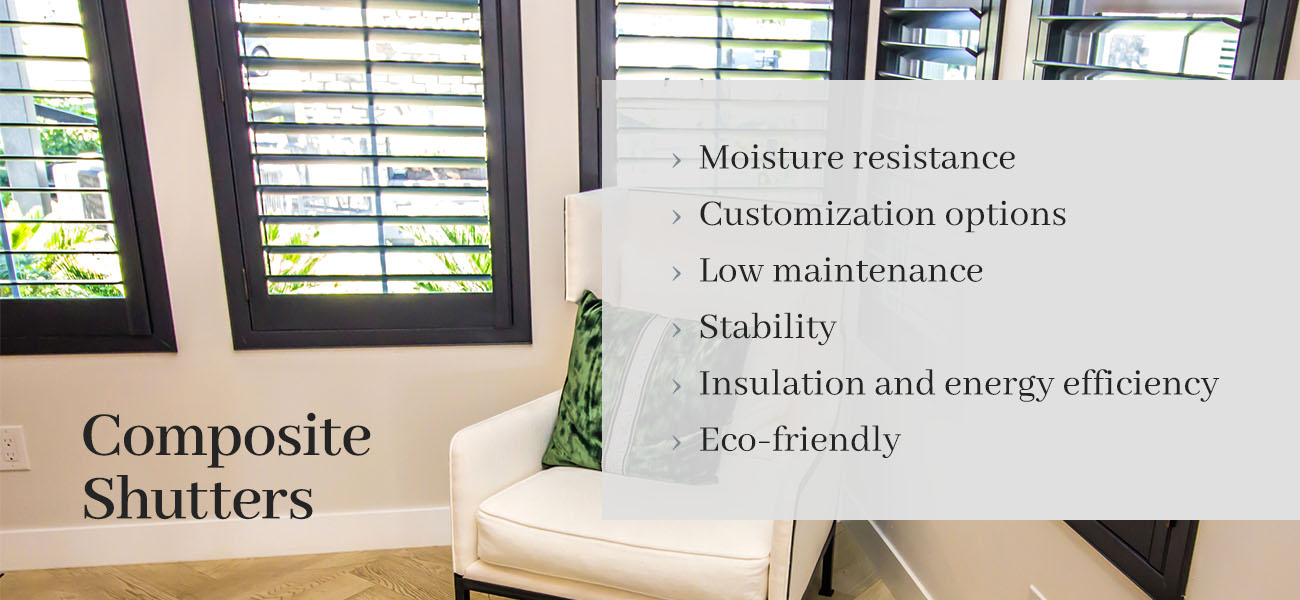
- Moisture resistance: Composite shutters are specifically engineered to resist moisture and are less susceptible to issues like rotting, splitting or mold growth.
- Customization options: Composite shutters offer a wide range of color, style and finish customization options. They can be painted or stained to match your desired aesthetic, allowing you to achieve the desired look and feel for your windows.
- Low maintenance: One of the significant advantages of composite shutters is their low maintenance requirements. They do not require regular sanding, painting or staining. Cleaning them with a mild detergent and water is typically sufficient to keep them in good condition.
- Stability: Composite shutters are resistant to warping or twisting. They maintain their shape and structure over time, providing a consistent and visually appealing appearance.
- Insulation and energy efficiency: Composite shutters offer insulation properties, helping to regulate temperature and reduce energy consumption. They can contribute to maintaining a comfortable indoor environment and lower heating and cooling costs.
- Eco-friendly: Many composite shutters are made from recycled materials, making them eco-friendly.
Cost is also one of the main differences between composite vs. vinyl shutters, as composite can be more expensive. The higher cost is often attributed to the advanced manufacturing processes and materials used to create composite shutters.
The shutters can be heavier than other shutter materials, such as vinyl or wood. This weight can make installation more challenging and may require additional support or reinforcement for the window frames. It’s essential to ensure that the structure and hardware of your windows can accommodate the weight of composite shutters.
PVC Shutters
PVC shutters, or poly shutters, are constructed entirely from polyvinyl chloride. These shutters are designed to withstand moisture, making them an excellent choice for high-humidity environments such as bathrooms or coastal areas. PVC shutters resist fading, cracking and warping. Other benefits include:
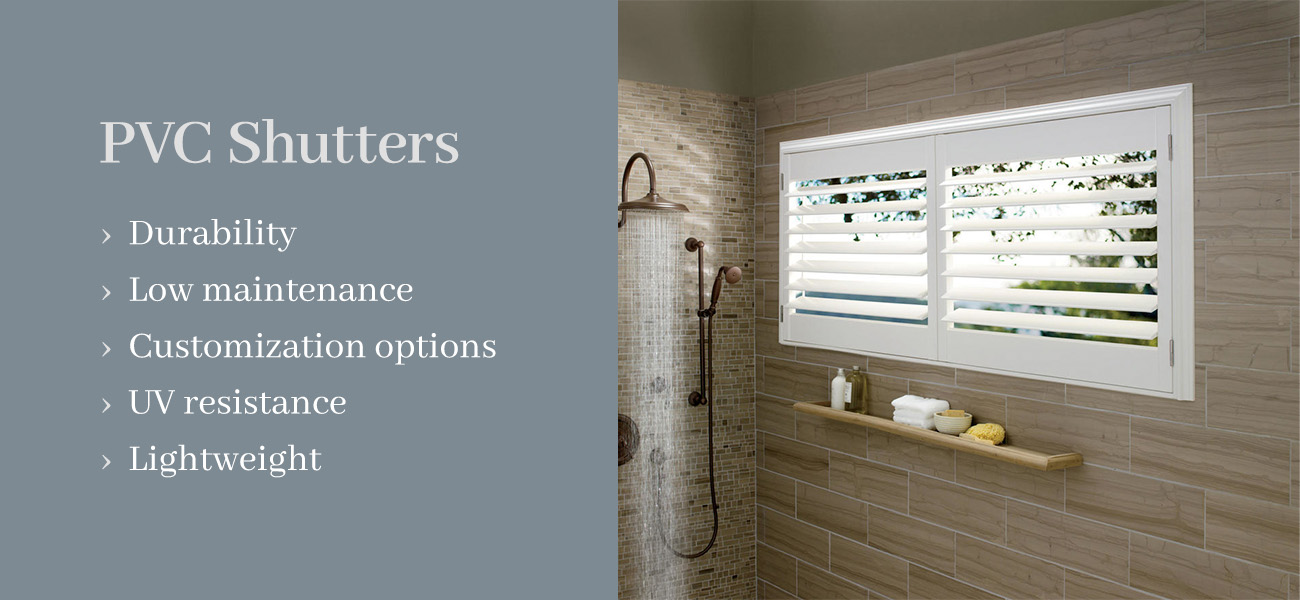
- Durability: PVC shutters are long-lasting performance and moisture resistant. They are also resistant to fading, chipping and peeling, making them suitable for interior and exterior applications.
- Low maintenance: One of the significant advantages of PVC shutters is their low maintenance requirements. They are easy to clean and maintain, requiring only a damp cloth or mild detergent to remove dust or dirt.
- Customization options: PVC shutters come in various styles, colors and finishes, allowing customization to match your preferred aesthetic and design scheme. They can be tailored to fit different window sizes and shapes, providing versatility in installation.
- UV resistance: They are designed to withstand exposure to ultraviolet (UV) rays without fading or discoloration. This UV resistance ensures that the shutters maintain their original appearance and color over time, even in direct sunlight.
- Lightweight: PVC shutters are lightweight compared to other materials, making them easier to install and operate. The lighter weight also puts less strain on the window frames and hinges.
When looking at wood vs. PVC shutters, PVC shutters may have a more synthetic or plastic-like appearance, which may not appeal to those seeking a more traditional look. They also have limitations regarding larger window sizes or irregularly shaped windows.
Metal Shutters
Metal shutters, often made from aluminum or steel, are known for their durability and strength. They are ideal for homeowners seeking protection against storms, intrusions or extreme climates. Additional features include:
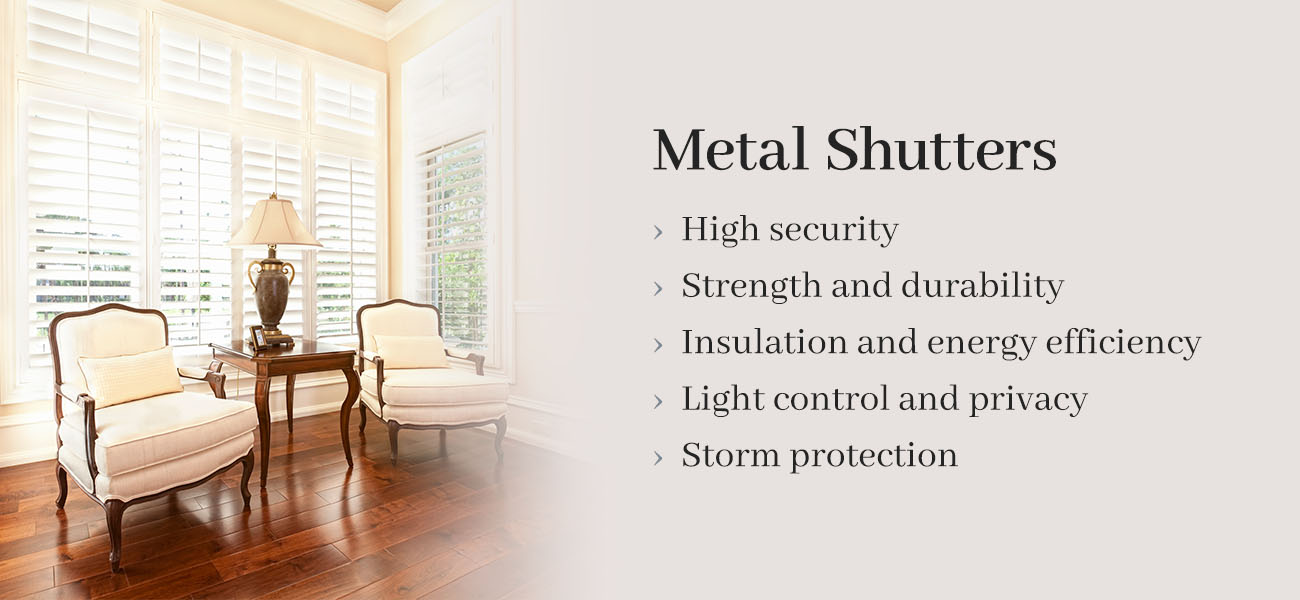
- High security: Metal shutters offer robust security features, serving as a strong deterrent against unauthorized entry, vandalism and forced intrusion. They provide a physical barrier that is difficult to breach, offering peace of mind and added protection for homes and businesses.
- Strength and durability: Metal shutters are constructed from durable materials such as aluminum or steel, which are known for their strength and longevity. These shutters can withstand impacts, harsh weather conditions and attempted break-ins, providing long-lasting security.
- Insulation and energy efficiency: Metal shutters provide insulation benefits by creating an additional barrier between the window and the outside elements. They can help reduce heat transfer, minimize noise pollution and improve energy efficiency by regulating the temperature inside the building.
- Light control and privacy: Metal shutters offer adjustable light control and privacy options. They can be partially or fully closed, allowing for varying degrees of light penetration and privacy. This versatility allows for customization based on specific needs or preferences.
- Storm protection: Metal shutters are often used in areas prone to hurricanes, storms or severe weather conditions. They provide an extra layer of protection for windows, shielding them from high winds, flying debris and impact damage.
While metal shutters excel in terms of durability and security, they have limitations regarding their potential for corrosion. Exposure to moisture, saltwater or harsh weather conditions can cause rust and deterioration, affecting the appearance and functionality of the shutters.
They also have a higher tendency to absorb heat compared to other materials. In regions with hot climates, this can result in increased heat transfer to the interior of the building, potentially affecting the space’s energy efficiency.
Factors to Consider When Choosing Shutter Materials
Choosing the right shutter materials involves more than just aesthetics. It’s a decision that encompasses durability, style, maintenance and cost. As a buyer, evaluating these factors ensures that your chosen materials can withstand the test of time while perfectly complementing your home’s design.
Here are four primary factors to keep in mind:
1. Durability
Shutter materials vary in durability, so choose a material that can withstand the test of time. Consider the climate and environmental conditions in your area. If you live in a region with harsh weather conditions or high humidity, opt for materials known for their durability and resistance to moisture. This way, your shutters can remain sturdy and functional for years.
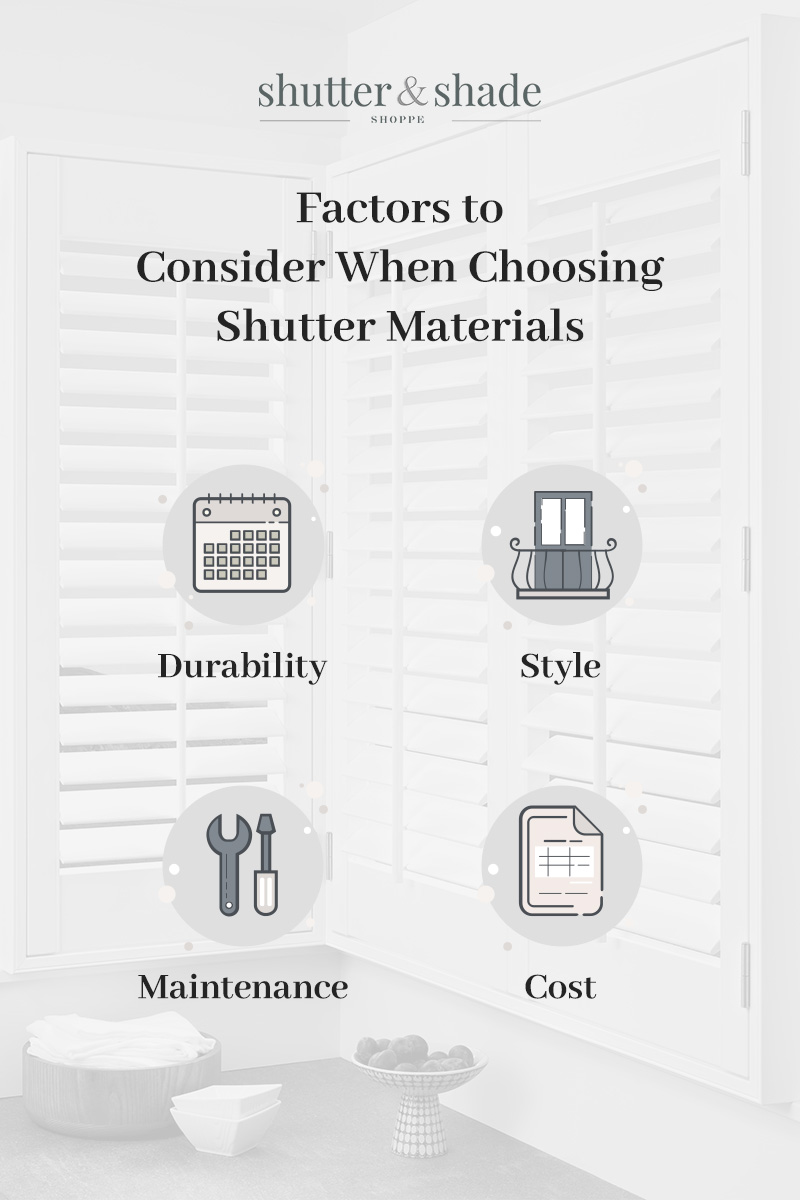
2. Style
Shutters play a significant role in enhancing the overall aesthetic appeal of your space. Consider the style and theme of your home when choosing shutter materials. Wood shutters, for example, exude warmth and natural beauty, adding a touch of elegance to traditional and rustic interiors. Vinyl and composite shutters offer a wider range of color options and can complement both contemporary and classic designs. You can create a cohesive and visually pleasing atmosphere by selecting materials that align with your desired style.
3. Maintenance
Another vital aspect to consider is the level of maintenance required for different shutter materials. Some materials may demand regular upkeep, such as sanding, painting or staining, to maintain their appearance and protect them from the elements. In contrast, other materials, like vinyl or PVC shutters, are known for their low maintenance requirements. Carefully evaluate the time and effort you’re willing to invest in maintaining your shutters, which can influence your material choice.
4. Cost
Different materials come with varying price points and it’s essential to determine the cost that fits within your budget. While wood shutters may offer a timeless and luxurious look, they are more expensive than vinyl or PVC alternatives. Composite shutters provide a balance between cost and durability. Consider each material’s long-term value and benefits to make an informed decision that aligns with your financial goals.
Step-By-Step Guide to Make an Informed Decision
With numerous available options, it’s easier to follow a step-by-step guide to make an informed decision that aligns with your needs and preferences. We have developed a step-by-step guide to interior window shutters that takes you through the considerations:
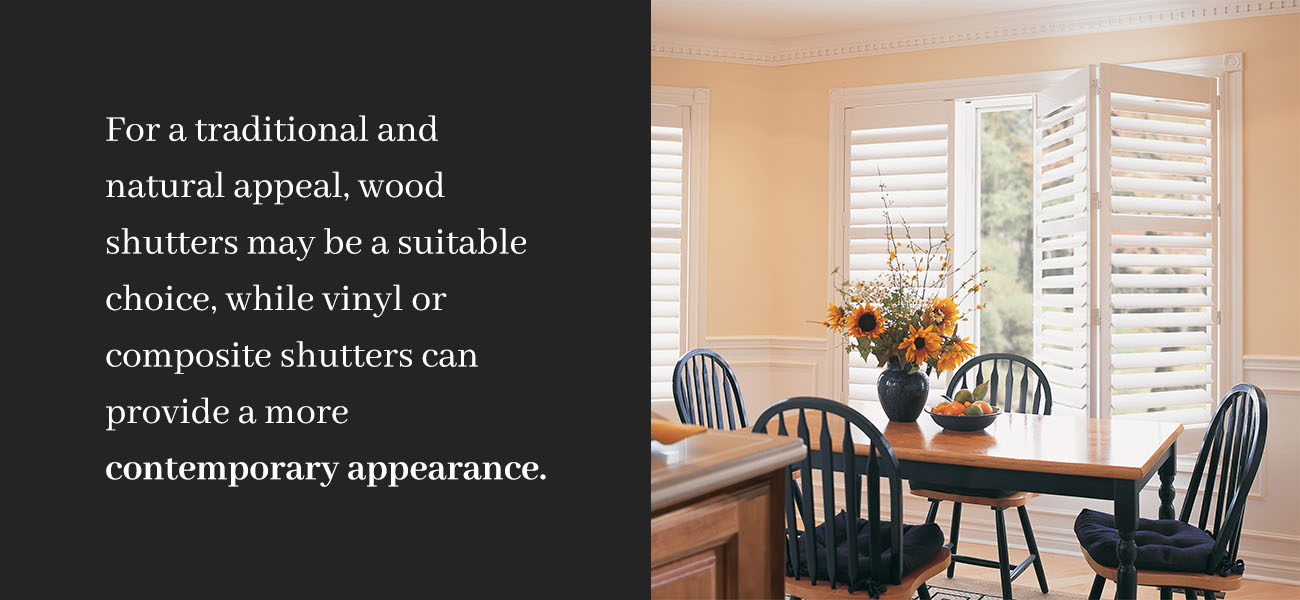
- Assess your needs and priorities: Identify your specific needs, preferences and priorities. Consider factors such as aesthetic appeal, durability, maintenance requirements, climate considerations, energy efficiency, budget and desired functionality. This will help you establish clear criteria for selecting the right shutter material.
- Research different shutter materials: Thoroughly research the different shutter materials available on the market. Understand the features, advantages and disadvantages of each material. Pay attention to factors like durability, maintenance, aesthetics, insulation properties and suitability for your climate and desired functionality.
- Consider your home’s architecture and style: Different materials have distinct looks and textures. For a traditional and natural appeal, wood shutters may be a suitable choice, while vinyl or composite shutters can provide a more contemporary appearance.
- Set a budget: Determine how much you are willing to spend and consider the long-term value and benefits of each shutter material concerning your budget. Remember to account for installation costs, additional hardware and any customization options you desire.
- Consult with professionals: Consult with professionals, such as shutter manufacturers, suppliers or home improvement experts, to gain insights and expert advice. They can provide valuable information, answer your questions and guide you in selecting the right shutter material based on your needs, preferences and budget.
Frequently Asked Questions (FAQ)
Got questions about shutters? Wondering what kind of indoor shutters you should get? We’ve got you covered. In this FAQ section, we address some of the most common queries that arise when choosing, maintaining and optimizing shutters for your windows.
Can Shutters Provide Security Benefits?
Yes, shutters, especially metal ones, offer added security for your windows. Metal shutters provide a physical barrier against intrusion, helping to deter potential burglars and protect your property. They can be particularly beneficial in areas where security is a concern. Consult a shutter specialist to explore security features and options for your specific needs.
Which Material Is the Most Durable for Shutters?
When it comes to durability, several window shutter materials stand out. PVC or vinyl shutters may be better for durability. However, wood shutters, especially those made from hardwoods like cedar or basswood, are also known for their strength and longevity. Composite shutters, constructed from a mixture of wood and synthetic materials, also offer excellent durability. Metal shutters, such as aluminum or steel, are highly resilient and provide enhanced security.
Can I Paint or Stain My Shutters to Match My Home’s Decor?
Wood shutters offer the flexibility to be painted or stained in various colors to match your home’s decor. Vinyl shutters, on the other hand, are typically available in a range of pre-finished colors and may not be suitable for painting. Composite shutters may have limited paint options, so it’s best to check with the manufacturer for recommendations.
Are There Eco-Friendly Options for Shutter Materials?
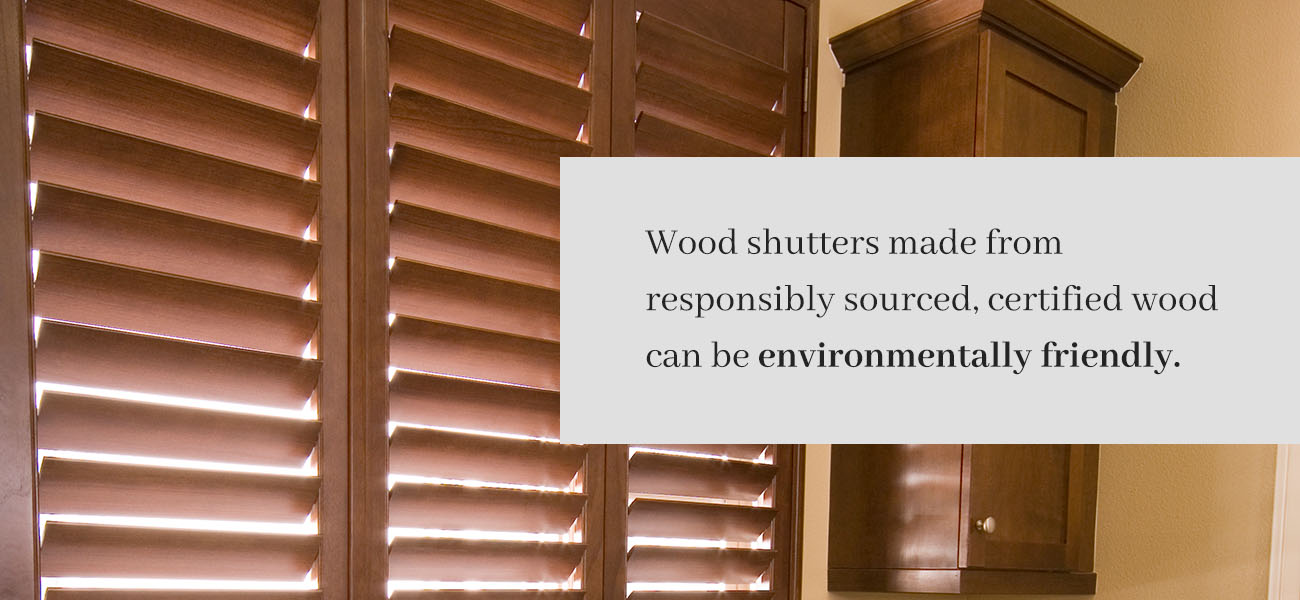
Certain shutter materials offer more sustainable choices. Wood shutters made from responsibly sourced, certified wood can be environmentally friendly. Composite shutters that incorporate recycled materials or are manufactured using sustainable practices are also available. It’s worth researching and consulting with suppliers prioritizing eco-conscious manufacturing and sourcing.
Can I Customize the Size and Design of My Shutters?
The level of customization available may vary depending on the material and manufacturer. Wood shutters often offer more customization options, allowing you to specify the size, louver width and design details. Vinyl and composite shutters may have some customization available, but it’s best to check with the manufacturer or supplier to understand the extent of customization options. Metal shutters may have limited customization due to the nature of the material and manufacturing process.
Can I Install Shutters Myself or Should I Hire a Professional?
While some homeowners may opt to install shutters themselves, hiring a professional for the installation process is generally recommended. Professional installers have the expertise and experience to ensure precise measurements, proper fitting and secure installation, resulting in a seamless and long-lasting finish. Additionally, many shutter providers, such as Shutter & Shade Shoppe, offer installation services as part of their package, ensuring a hassle-free experience.
Discover the Perfect Shutters With Shutter & Shade Shoppe
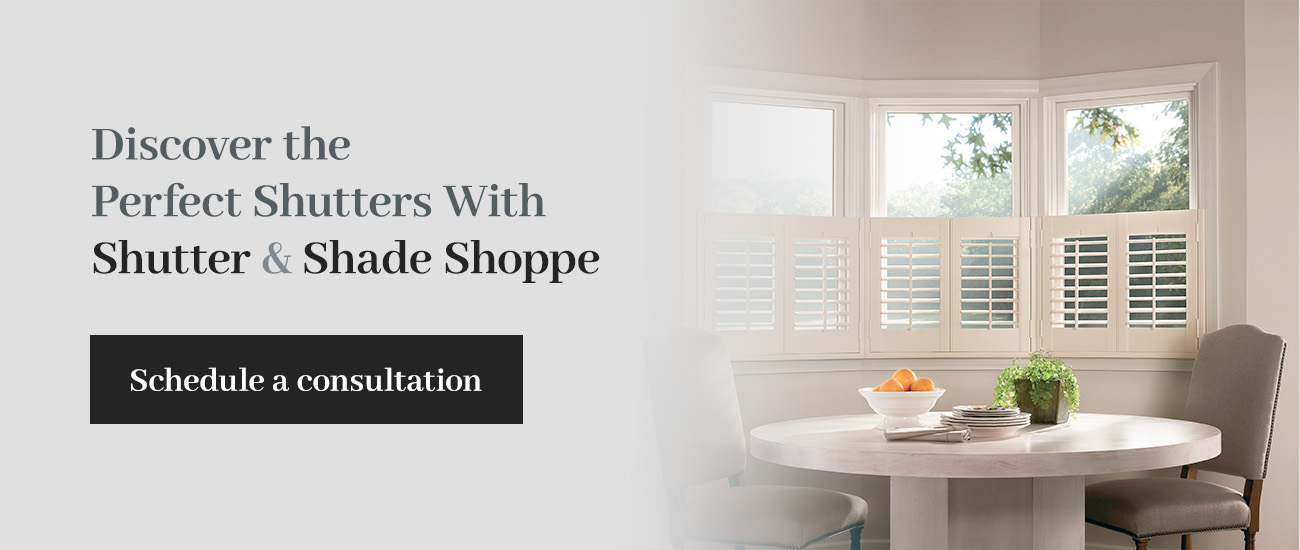
If you’re ready to transform your windows and enhance your living spaces, look no further than Shutter & Shade Shoppe. As a trusted provider of premium shutters, you’ll enjoy an extensive selection of high-quality materials and styles to suit any taste. With their expert guidance, you can find the ideal shutters that meet your needs and budget.
What sets Shutter & Shade Shoppe apart is their commitment to excellence from start to finish. Not only do they provide top-notch products, but they also offer professional installation services, ensuring a seamless and hassle-free experience. With their skilled team handling the installation, you can confidently enjoy your new shutters, knowing that they are expertly fitted to your windows.
Don’t wait any longer to elevate the style and functionality of your windows. Take the first step towards transforming your living spaces by visiting Shutter & Shade Shoppe’s website or contacting their friendly team today. Discover the possibilities that await you and turn your vision into reality.
Remember, every window tells a story — let us help you create a captivating tale through their exceptional selection of shutters and dedicated service. Schedule a consultation today.
